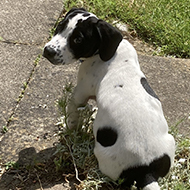Generation Pup study recruits 5,000th puppy

Jack's owner says that he is settling in well, and loves exploring the garden and playing with footballs.
'Generation Pup', a study run by Dogs Trust, has just recruited its 5,000th puppy. The puppy, Jack, is a 14 week-old male crossbreed from Hertfordshire.
The recruitment of their 5,000th puppy marks the halfway point of the Generation Pup study, which aims to recruit 10,000 puppies in all. Launched in 2016, the Generation Pup cohort study tracks puppies under 16 weeks old through to adulthood, and aims to learn how the dogs' early experiences in life affects their health and behaviour later.
Tracking the dogs' experiences, environment, diet, and exercise regimes, the landmark study is the first of its kind, allowing researchers to gain unique and ground-breaking new insights into canine behaviour and experience. This research then hopes to improve dog welfare for future generations of dogs.
Jack is owned by Ruth Lewis, from Hertfordshire, and speaking about her puppy, she said: “Jack is a cross breed; he is 1/8 Springer, 3/8 Cocker, 3/8 Staffy and 1/8 Jack Russell so half terrier, half spaniel.
“Jack is settling in really well. He loves exploring our garden and playing with footballs. He’s confident with other dogs but knows to back off when a dog is not so friendly. He played a lot with his siblings and his dad, who was very bouncy, and I think this has helped a lot.
“We started to take him outside the garden for walks on the ground a couple of weeks ago and he thinks everyone wants to make friends with him. It’s safe to say walks are a little slow.
“We went to our first Dog School session at the weekend, and it went really well. I think Jack is a totally normal puppy, which is exactly what I was hoping for.”
Generation Pup research manager, Dr Jane Murray, commented on the recruitment: “It is wonderful that we’ve recruited 5,000 dogs and we’re so grateful to all the owners who give up their time to help with the study.
“We would love to reach 10,000 doggy recruits so, if you have a puppy, please sign up online. The more puppies we have signed up to the study, the greater potential we have to understand more about our dogs and how to help them in the future.”
In order to be registered onto the study, puppies must be under 16 weeks of age, unless they have gone through quarantine, in which case they can be registered up to 21 weeks. Generation Pup is open to all breeds and crossbreeds, and participants can be anywhere in the UK and Republic of Ireland.
For more information, or to sign up your puppy, visit: generationpup.ac.uk



 The Veterinary Medicines Directorate (VMD) is inviting applications from veterinary students to attend a one-week extramural studies (EMS) placement in July 2026.
The Veterinary Medicines Directorate (VMD) is inviting applications from veterinary students to attend a one-week extramural studies (EMS) placement in July 2026.